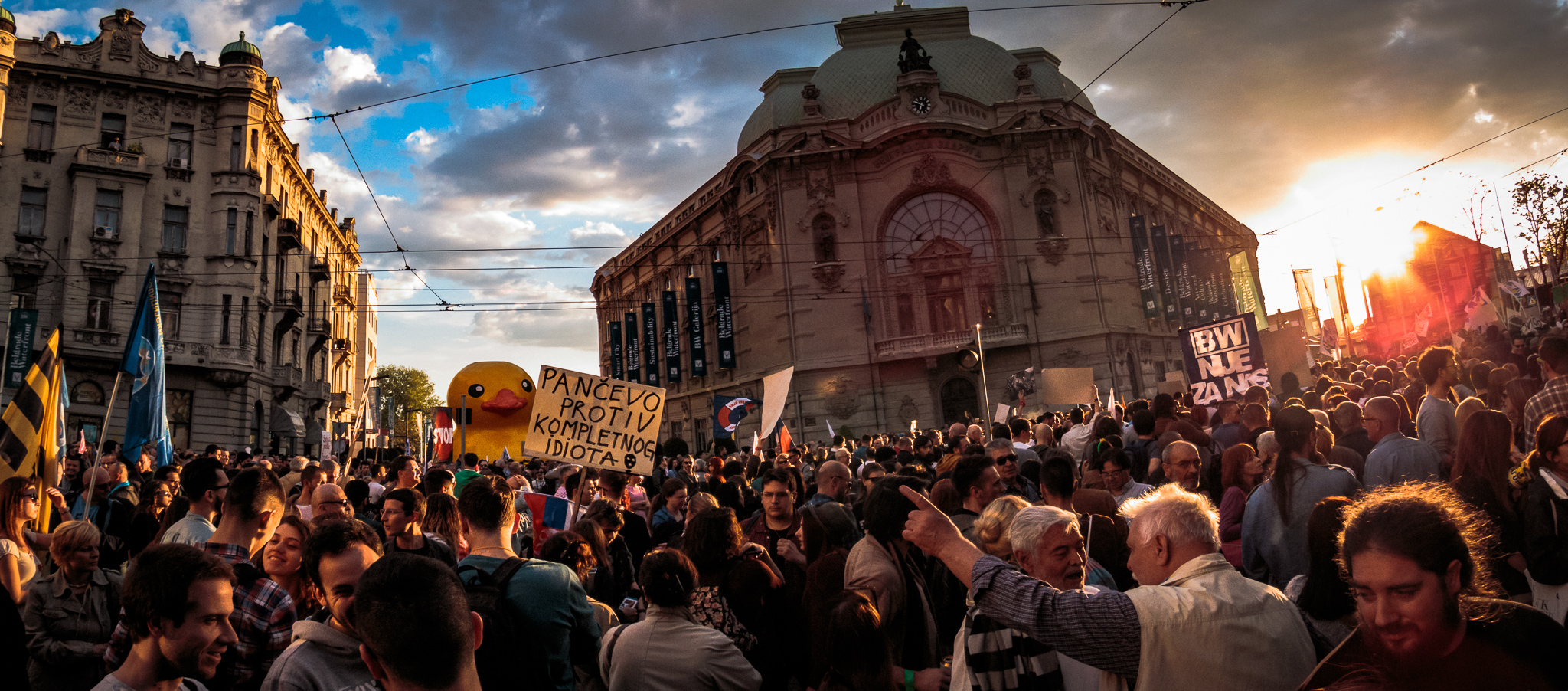Jan 10, 2024
Serbian elections: a postcard from the doorsteps of the EU
Jelena Vasiljević comments on recent allegations of electoral fraud in Serbia – and the EU’s inadequate response.
Serbia finds itself in another political impasse following yet another round of snap elections, held in this country more regularly than the “regular” ones. After president Vučić announced the early parliamentary election for 17 December 2023, 65 heads of municipalities, the Belgrade mayor included, resigned for no apparent reason, making it necessary to hold the local elections in those municipalities as well, ahead of the regular local elections due for spring 2024 – a tactic that will prove to be in function of manipulating the electoral results.
On the day of the elections, observers noted one irregularity that stood apart from the standard repertoire of electoral abuses we have unfortunately become used to in Serbia. The buses from Republika Srpska – a Serb-dominated entity in Bosnia-Herzegovina – were spotted in the city, transporting individuals who, upon inquiry, seemed unfamiliar with their voting locations and how to reach “their” municipalities and voting posts.
On-site controllers reported voters appearing without knowledge of their addresses, raising suspicions of fraudulent voter registration with false residencies. Days later, the independent Center for Research, Transparency and Accountability, CRTA, “identified instances of organised transportation of voters, supervised voting, [and] possible identity manipulation of voters”, particularly in Belgrade.
Allegations surfaced about “migrant voters” from Bosnia-Herzegovina and municipalities where local elections were not held, potentially explaining the coordinated resignation of some municipal offices. Concerns grew that a significant number of people were registered – only a couple of weeks ahead of the elections – in municipalities where they do not reside, especially in Belgrade, where public surveys continuously indicated the greatest chances for the opposition to topple the ruling regime.
Accusations of fraudulent elections triggered protests, including a hunger strike by some opposition figures. Yet, a viable solution remains elusive.
Accusations of fraudulent elections triggered protests, including a hunger strike by some opposition figures. Yet, a viable solution remains elusive. This political crisis compounds a series of grim events marking the preceding year in Serbia. 2023 was painfully marked by a school shooting where a 13-year-old boy killed eight fellow students and a school guard, wounding several more. The following day, a 21-year-old went on a killing spree leaving behind nine victims, primarily young people. A week prior, The New York Times published a long piece on close ties between Serbia’s top leadership and the violent drug gangs heavily implicated in brutal murders. It was one of the rare occasions that one could read in a major international media outlet something most of us in Serbia know all too well: that the political regime has not only captured state institutions and media, and massively abused state resources, but also maintains close ties with the criminal world, and as a consequence, violence has become ubiquitous and normalised.
But the May events broke something in society and unleashed the biggest wave of protest since the ousting of Milošević. The entire spring and summer citizens protested under the banner of Serbia against violence. Pro-EU parts of the opposition formed a coalition under the same slogan, winning 23.66% of votes nationally and 35.5% in Belgrade elections. However, doubts about this outcome, especially in Belgrade, persist. The opposition is now calling for the annulment of electoral results and a rerun, appealing to the international community and the EU. What has been the answer thus far?
Initially, EU officials expressed concern over electoral irregularities, but as time passed, criticisms waned. Meanwhile, Serbia made a decision that Vučić himself claimed on several occasions would never be made: drivers from Kosovo, with Kosovo license plates, can now freely enter Serbian territory without hiding national insignia. Just as many times before, Vučić delivered something, so that the blind eye could be turned to his usurpation of power.
Like in the case of the aforementioned New York Times article, the EU stirred only for a moment. As soon as Vučić delivers what the EU asks of him – whether it is joining the Crimea platform (and exporting weapons to Ukraine, both of which were ominously absent from Serbian media), making a step towards recognizing Kosovo (while at the same time creating a media frenzy over the issue and a war-like atmosphere), or who knows, further sealing the deal about the lithium mining in Western Serbia – concerns about corruption, ties with mafia, suppression of all freedoms, consolidation of autocracy, fade away.
Meanwhile, the pro-European stance of parts of the opposition loses meaning in a country where support for joining the EU has dropped below 50%.
Meanwhile, the pro-European stance of parts of the opposition loses meaning in a country where support for joining the EU has dropped below 50%. The optimism of the post-Milošević era, blending democratisation efforts with Europeanization, has dwindled. With growing nationalism and rising support for populist leaders – another discovery of the recent elections, where the ultimate surprise was the electoral success of a conspiracy theorist and anti-vaxxer – citizens of Serbia clearly show that their bets for the future are not on the EU. Reasonable fears are that should the EU continue to proceed with its transactional relations with local strongmen and autocrats, similar feelings might become contagious and the long-term political effects devastating.
Jelena Vasiljević is a Senior Research Associate at the Institute for Philosophy and Social Theory, University of Belgrade. Her academic background is in political anthropology and citizenship studies, and her research and activist interests include citizenship rights, civic engagement, social movements, and cultural memory in Southeast Europe. Presently, she is primarily interested in theories and practices of solidarity. As a member of a green-left political coalition, she has served as a Belgrade city councillor. She sits on the EA Transnational Board.
